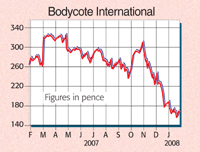Share tip of the week: downtrodden firm will get picked up
This supplier of metallurgical services to the aerospace and automotive industries has suffered from fears that a global slowdown could hit its customers' order books. However, the company now looks like good value for the long-term investor.
Get the latest financial news, insights and expert analysis from our award-winning MoneyWeek team, to help you understand what really matters when it comes to your finances.
You are now subscribed
Your newsletter sign-up was successful
Want to add more newsletters?

Twice daily
MoneyWeek
Get the latest financial news, insights and expert analysis from our award-winning MoneyWeek team, to help you understand what really matters when it comes to your finances.

Four times a week
Look After My Bills
Sign up to our free money-saving newsletter, filled with the latest news and expert advice to help you find the best tips and deals for managing your bills. Start saving today!
This supplier of metallurgical services to the aerospace and automotive industries has suffered from fears that a global slowdown could hit its customers' order books. However, the company now looks like good value for the long-term investor.
Bodycote International (BOY), rated OUTPERFORM by Credit Suisse
Bodycote is the world's top provider of specialist metallurgical services for the aerospace (20% of turnover), automotive (19%), oil and gas (8%), power generation (6%) and general manufacturing industries. Its largest unit is metals heat-treating, at 66% of sales, followed by materials testing (27%) and hot isostatic pressing (7%), which is used to produce top-notch components.
All three units are doing well, driven by robust markets, increasing regulation and outsourcing. Despite tougher conditions in North America, especially in car production, like-for-like sales in constant currency terms rose by 8% in the second half from 7.3% in the first, reflecting resilient demand in all its main markets. Due to the sophisticated nature of its technologies and the solid economics underpinning outsourcing deals, the group's operating profit margins are also healthy at around 15%.
MoneyWeek
Subscribe to MoneyWeek today and get your first six magazine issues absolutely FREE

Sign up to Money Morning
Don't miss the latest investment and personal finances news, market analysis, plus money-saving tips with our free twice-daily newsletter
Don't miss the latest investment and personal finances news, market analysis, plus money-saving tips with our free twice-daily newsletter
Chief executive John Hubbard says the trend towards outsourcing (accounting for around 22% of turnover) has helped Bodycote's "growth in Western nations, where manufacturing may be stable or shrinking, and in developing countries, where it's also often much cheaper to bring in a specialist". At a trading update in December the board reconfirmed that 2007's underlying results would hit City hopes and that it was confident of the firm's prospects. It added that "our key aerospace, power generation and oil and gas sectors are forecasting buoyant conditions for 2008".

So why the lacklustre rating? Well, with fears over the health of the global economy, investors are worried that Bodycote's customers will suffer, hitting future earnings. Secondly, at last count the group had £163m of net debt on top of a £33m pension deficit albeit interest payments are comfortably covered ten times by adjusted operating profits. Finally, it has hefty exposure to the dollar and euro, but this currency risk may actually boost results if sterling continues to soften in 2008.
With its leading position in growing markets, Bodycote looks good value for the long-term investor. Indeed, two non-executive directors, including the chairman, seem to agree, as together they splashed out £66,000 on shares before Christmas, at prices ranging between 184p and 192p. Lastly, at these downtrodden levels there is always a chance that it could receive another takeover approach, following its rejected offer of 346p per share from Swiss engineer Sulzer in April 2007. Bodycote's full-year results are due on 26 February, with a progress report on its acquisition strategy out shortly.
Recommendation: BUY at 177p (market cap £573m)
Paul Hill also writes a weekly share-tipping newsletter, Precision Guided Investments
Get the latest financial news, insights and expert analysis from our award-winning MoneyWeek team, to help you understand what really matters when it comes to your finances.
Paul gained a degree in electrical engineering and went on to qualify as a chartered management accountant. He has extensive corporate finance and investment experience and is a member of the Securities Institute.
Over the past 16 years Paul has held top-level financial management and M&A roles for blue-chip companies such as O2, GKN and Unilever. He is now director of his own capital investment and consultancy firm, PMH Capital Limited.
Paul is an expert at analysing companies in new, fast-growing markets, and is an extremely shrewd stock-picker.
-
 Can mining stocks deliver golden gains?
Can mining stocks deliver golden gains?With gold and silver prices having outperformed the stock markets last year, mining stocks can be an effective, if volatile, means of gaining exposure
-
 8 ways the ‘sandwich generation’ can protect wealth
8 ways the ‘sandwich generation’ can protect wealthPeople squeezed between caring for ageing parents and adult children or younger grandchildren – known as the ‘sandwich generation’ – are at risk of neglecting their own financial planning. Here’s how to protect yourself and your loved ones’ wealth.